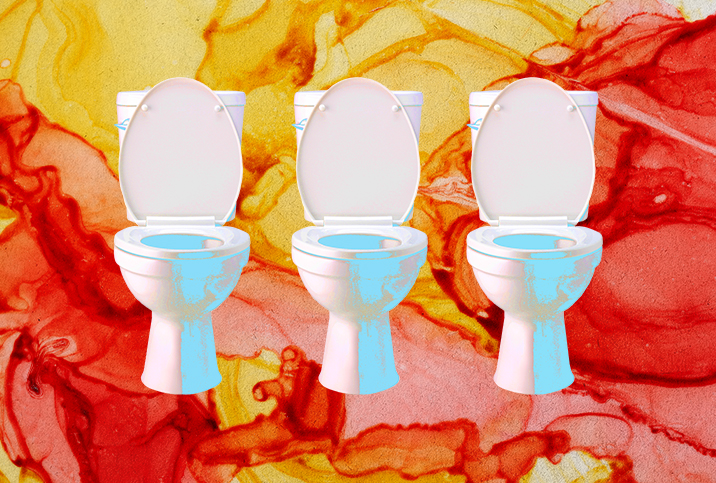Are Traces of Blood in Urine Normal?

Urinating is part of our body's normal process for eliminating toxins. On average, we urinate six or seven times in a 24-hour period, and the volume ranges from 27 to 67 fluid ounces. We spend so much of our time accommodating these bodily functions that a change in this pattern may feel dramatic. When we see blood in our urine, the splash of red might seem like a particularly foreboding sign.
While it's true blood in urine could be a sign of a major health issue, more often than not, it's a sign of a treatable condition.
"Blood in the urine can be alarming, but the causes are very straightforward," said Suzette E. Sutherland, M.D., the director of female urology at UW Medicine Pelvic Health Center, part of the University of Washington in Seattle. "Blood is most often caused by a urinary tract infection, other times a kidney stone and, less commonly, cancer."
Urinary tract infections (UTIs)
"We typically include a culture of UTIs when we test for sexually transmitted infection," said Anne Rompalo, M.D., a board member of the American Sexually Transmitted Diseases Association in North Carolina. "These infections are so common and have such subtle symptoms that many patients don't realize they have a UTI.
"Once patients hear the symptoms listed, such as lower back pain, bloating and a picking or burning sensation, they realize that they have noticed these symptoms but thought it was normal," Rompalo continued.
"My first step when a patient seeks treatment for urinary problems is to examine their urinary tract and genitalia for signs of infection," Sutherland said, explaining that many patients don't realize their infection is severe, but once they see the signs, they learn to look out for them.
Typically, prescribing antibiotics, encouraging patients to hydrate as much as possible and addressing proper hygiene habits are enough to treat the infection and prevent recurrence.
"While seeing a urologist is beneficial, most UTIs can be treated by your primary care physician," Sutherland said. "However, a urologist should be consulted if you have recurring urinary or bladder infections, because we have the tools to examine your urinary system to learn what might be causing these chronic infections."
The best-case scenario to treat recurring UTIs is simply to adapt lifestyle habits, Sutherland said. For example, many patients are so busy they may hold their urine, which allows bacteria to build up, or forget to drink fluids, which prevents flushing of the urinary tract.
"Other times, patients can have anatomical differences, such as the urinary tract's width or how the bladder sits in the pelvis," Sutherland said. "In these instances, there are simple procedures that can be performed in an outpatient setting that can fix and prevent these chronic UTIs and bladder complications."
Kidney stones and bladder dysfunction
"The best diagnostic practice for any patient with urinary problems is to scope the urinary tract," Sutherland explained.
These procedures were once very uncomfortable, but modern technology allows for smaller cameras so patients can be scoped in the office with only mild discomfort.
"These diagnostics allow us to see the full urinary tract, even into the bladder," she said. "This full picture can help us with the process of elimination, which in turn gets us to a diagnosis faster and that means we can help you feel better sooner."
The most common source of bleeding, outside of an infection, is a kidney stone, Sutherland noted. These stones are hard, which can cause irritation to the urinary tract resulting in bleeding, and passing a kidney stone is often very painful.
"When you get to this stage, you know it because you will often be in excruciating pain," Sutherland noted. "When there is bleeding and only mild discomfort, this can be a warning sign of a kidney stone that has not yet been passed."
High-impact activities such as long-distance running and sports can jostle a kidney stone, which can cause irritation that results in blood in the urine. When a stone is detected early, medications can help dissolve it before it becomes a concern, effectively treating the bleeding in the process.
More serious conditions
"The patients who have blood in their urine with no secondary concerns are the patients I worry about," Sutherland said. "My approach in these instances is to first scope the urinary tract to rule out bladder complications and then I will also follow up with a kidney and bladder ultrasound."
While it can be common for patients to experience mild or no symptoms aligning with other conditions, cancer could be indicated in some people. By scoping and performing ultrasound testing, she can find tumors and other growths in their early stages.
"The earlier we catch the condition, the easier it is to treat," Sutherland explained. "No one wants to hear that they have a growth or even cancer, but avoiding treatment is a sure way to make the condition worse and increase your discomfort."
Regardless of your symptoms, blood in urine is alarming. Sutherland encouraged patients to seek treatment.
"Don't let this fear paralyze you," she said. "Use this fear as a push to pick up the phone and schedule an appointment."


















